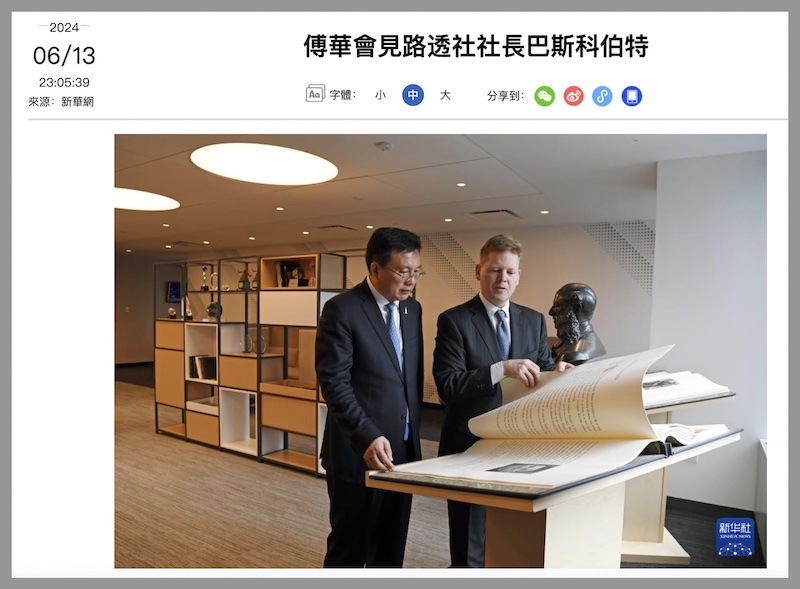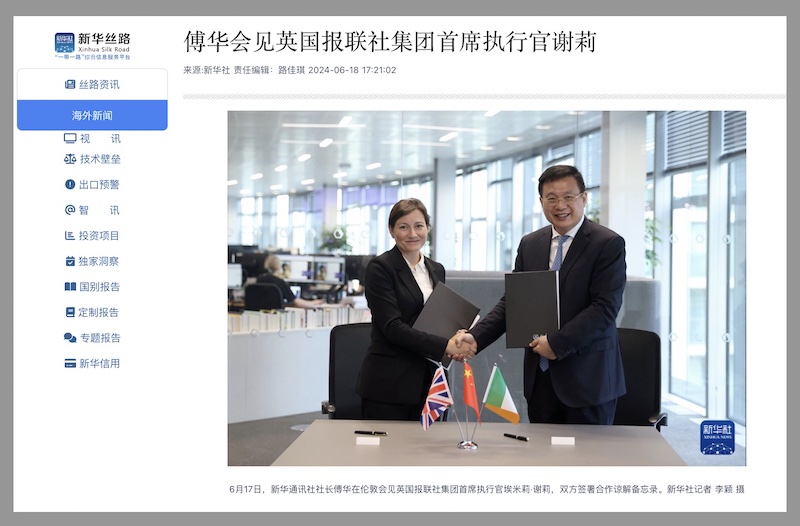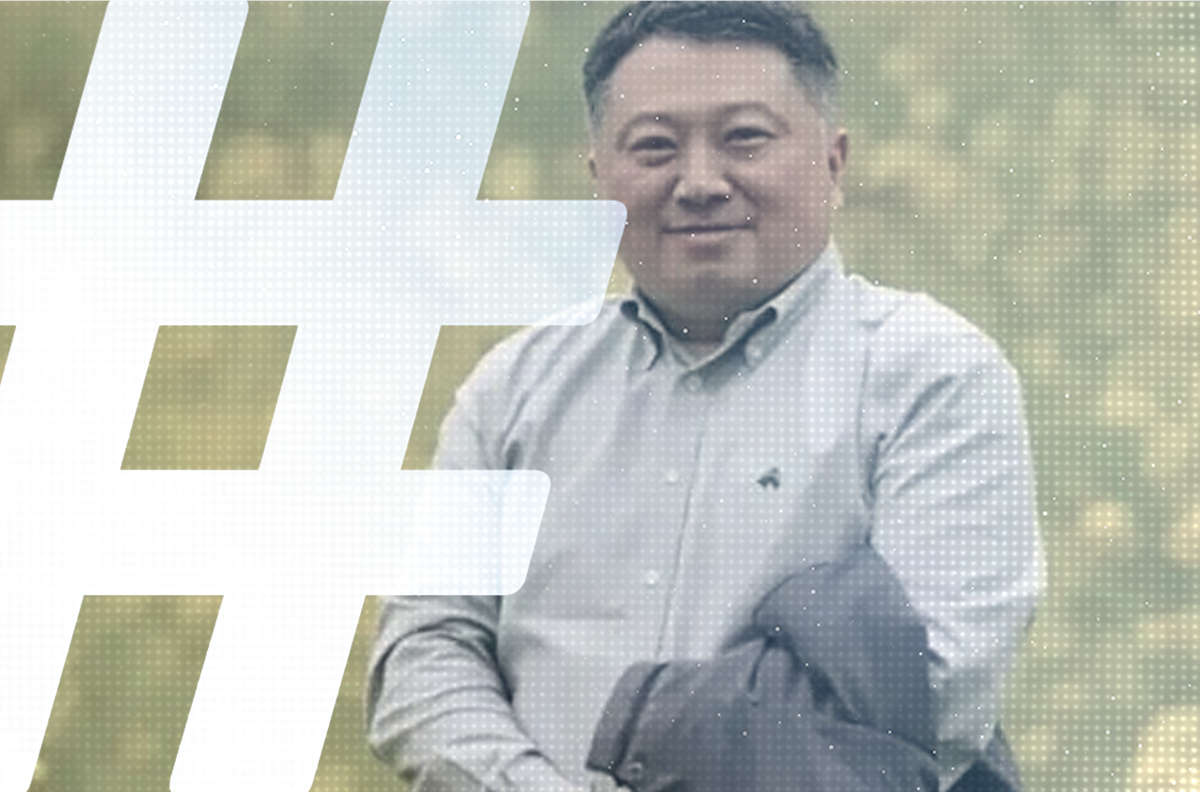
More than five years ago, the top bosses at several US media companies, including the Associated Press (AP), were taken to task by lawmakers in Washington for partnerships with Chinese state media. They expressed concern that such cooperation might compromise the integrity of news and information outside of China as the country’s leadership pursued greater influence over global public opinion.
For all the criticism such partnerships have caused, they show no signs of abating. This was evidenced last month as the president of China’s official Xinhua News Agency, which sits directly under the country’s State Council, made a whirlwind tour from New York to London, meeting with top executives from AP, Reuters, and PA Media Group.
The deal between Xinhua and AP, which involved cooperation on the distribution of photos, videos and press releases, was finalized with a handshake and the exchange of signed copies. It was covered enthusiastically by Xinhua. For AP, meanwhile, the story was apparently not news — no reporting was available. The same pattern held for Reuters and PA Media Group: enthusiastic coverage from Xinhua, silence from its partners.
These deals with Xinhua should invite tougher questions about how international media companies with a stated commitment to professional standards should deal with Chinese media giants whose sole commitment — crystal clear in the country’s domestic political discourse— is to strengthen the global impact of Party-state propaganda.
These partnerships are part of a broader effort by Xinhua to deepen its global media influence, curtailing criticism of the Chinese government and shaping international discourse that portrays the CCP in a positive light. And yet, year in and year out, Western media executives insist, even against the substance of their own statements, that this type of cooperation is just normal business.
The Politics of the Purely Commercial
In 2019, as AP faced blowback from members of the US Senate for cooperation with Xinhua, the global news wire’s then-CEO, Gary Pruitt reassured the lawmakers that the cooperation was “purely commercial in nature,” and that “AP’s business relationship with Xinhua is completely separate and firewalled from its journalistic coverage of China.”

According to the arrangement, Pruitt said, Xinhua and AP had agreed only to an optional arrangement by which the partners could share five text stories and five photos per day. “In practice, AP uses a fraction of those photos and publishes none of the stories,” said Pruitt. As for regular meetings on cooperation, Pruitt said, these are “often a formality.”
If it is true that AP “publishes none of the stories,” this raises the obvious question of why the arrangement is necessary or commercially viable at all. What is the point of such empty formalities? Read the fine print of Pruitt’s reassurance letter and the truth about the arrangement becomes clear. “Like most major news agencies,” said Pruitt, “AP has an agreement with state-run media in China that allows AP to operate inside the country.”
And there we have the crux. AP’s relationship with Xinhua, in place since 1972, is not commercial at all — not really. Instead, it is the political foundation on which AP and other major news agencies, including Reuters, are able to operate in China.
It should be obvious such conditionality has no place in any “purely commercial” arrangement. And as they obscure the true nature of the arrangement, news executives like Veerasingham and Pruitt do a huge injustice to the thousands of journalists who struggle each day to report the facts.
Again and again, international news executives lean into the act of the ostensibly commercial Xinhua deal. As Pruitt’s successor, Associated Press CEO Daisy Veerasingham, met with Xinhua President Fu Hua (傅华) last month, she spoke encouragingly of deepening cooperation. “We have seen many changes in the world,” she said, “but I think the relationship that the two organizations have forged together for so long is a really important indicator for how we can strengthen our relationship in the years ahead.”

What does it mean to strengthen a relationship that AP has consistently minimized in the face of scrutiny, and that it does not even care to disclose?
It bears emphasizing a simple, incontrovertible fact that no one in these instances is making clear — that Fu Hua is not merely a news agency executive but a senior Chinese official with a full ministerial rank, or zhengbuji (正部级), effectively giving him the same ranking as the country’s foreign minister. Fu was elevated three years ago to his current position from his previous role as a deputy minister of the Chinese Communist Party’s Central Propaganda Department. Fu is not a champion of shared media values, or a partner in tackling the information challenges of the future. His agenda is that of China’s ruling CCP. Plain and simple.
Meanwhile, this monstrous charade underwrites Xinhua’s credibility as a news agency as it seeks to work across the world, and even to place itself at the center of global media cooperation through a mechanism called the World Media Summit (WMS) — launched in 2009 under an explicit Central Committee directive and headquartered at Xinhua.
As Xinhua signed its MOU last month with PA Media Group in London, it even reported that this cooperation was to happen “under the framework of the World Media Summit.” At CMP, we called it clearly on the WMS 15 years ago. It is time for news executives to catch up.
Fortunately, there are signs of sobriety elsewhere in the international media. On Monday this week, Christoph Jumpelt, the head of the international relations unit at Germany’s public broadcaster, Deutsche Welle, said in a keynote speech here in Taipei that all independent news outlets across the world that uphold democratic values must cooperate to counter the growing threat of propaganda and censorship. “Together, we stand a far better chance of stemming the tide of propaganda,” he said.
“What [authoritarian] regimes have in common is their fear of a well-informed public,” Jumpelt added. “This goes to show the power behind free media.”
International media like AP, Reuters and PA Media Group that claim to uphold professional values need to decide where they stand. If they insist on the charade of standing with Xinhua, shaking hands and signing on the dotted line, they should at least be forthcoming about what exactly it is they fear.

David Bandurski




















